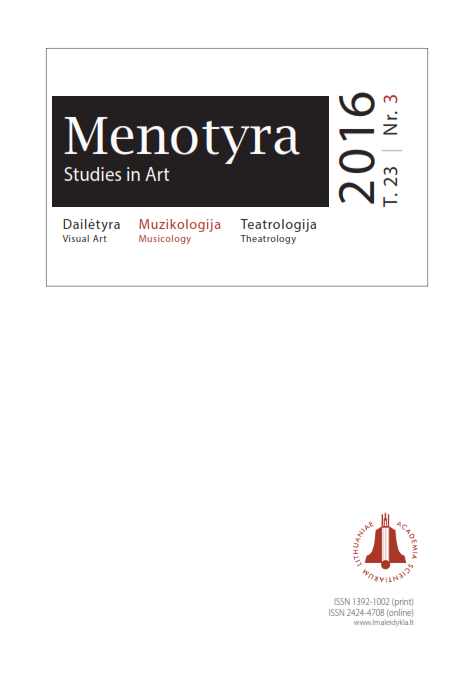Čiurlionio muzikinės kūrybos percepcija karo metais (1941–1944)
Perception of Čiurlionis’ musical creation during the war (1941–1944)
Author(s): Vytautė MarkeliūnienėSubject(s): Fine Arts / Performing Arts, Music, WW II and following years (1940 - 1949)
Published by: Lietuvos mokslų akademijos leidykla
Keywords: war and German occupation years; 1941-1944; M. K. Čiurlionis; symphonic poem Miške (“In the Forest”); cultural resistance
Summary/Abstract: With regard to musical life during the period of the war and the Nazi occupation, one of the cultural activists of the time, a composer, music critic and educator Vladas Jakubėnas wrote: “The only area where the accumulated Lithuanian spiritual energ y was free to manifest itself was art; and it existed leading an intense, meaningful Lithuanian life”. Back then, culture that was understood to mean conscious resistance, evolved into one of the most distinct manifestations of existence. In the conditions of this intense spiritual climate, musical life was progressing as well, and in certain spheres at a really hectic pace. Although a relatively small number of original works was produced by Lithuanian composers, Lithuanian music was frequently performed in symphony and chamber concerts, including the newest and earlier works by Julius Gaidelis, Vladas Jakubėnas, Antanas Račiūnas, Juozas Gruodis, Stasys Šimkus, Juozas Pakalnis, Julius Sinius, etc.In the context of musical events of the period discussed, the music of Mikalojus Konstantinas Čiurlionis constituted a special part and was mainly represented by symphonic poem Miške (“In the Forest”), while another symphonic poem Jūra (“The Sea”) was not performed. An interpretative tradition of Miške dates back to 10 December 1913, when it was played at a concert of Lithuanian music in Vilnius and was conducted by Adam Wylezinski. Before the war, Miške was interpreted by Izaokas Vildmantas-Zaidmanas, Stasys Šimkus, Balys Dvarionas, Juozas Tallat-Kelpša. A very specific insight into this symphonic poem was revealed by conductor Vytautas Marijošius, who also presented it outside Lithuania. In 1938, under his baton Miške was played by the Czech Philharmonic Orchestra at the Praha Radiophone.The first concert season of the war period started in September 1941 and symbolically was opened with Čiurlionis’ Miške performed by the Philharmonic Orchestra conducted by Šimkus. In two other concerts the poem was presented by composer and conductor Jeronimas Kačinskas, under whose guidance the Vilnius Philharmonic Symphony Orchestra achieved a really impressive level for that time. The orchestra had an opportunity to play Miške with the German conductor Hubert Günther in November 1943, whereas Marijošius was invited by Deutsche Gramophon Gesellschft to record Čiurlionis’ Miške with Städtisches Orchester Berlin in 1942. Unfortunately, the record was lost during bombing attacks; only a fragment of about seven minutes of Čiurlionis’ music survived. Čiurlionis’ works were also played at piano recitals, and his only String Quartet was performed by the quartet of Lithuanian musicians Izidorius Vasyliūnas, Jurgis Fledžinskas, Eduardas Satkevičius and Ernestas Bertovskis in their debut concert in June 1944.The major sources for investigating the perception of Čiurlionis’ music during the war period are memoirs of contemporaries and the press, whose response to music events was particularly enthusiastic. In fact, the writings dealing with Čiurlionis’ music rarely focused on interpretative issues and, practically, never on analysis of the composer’s works. During the war period, his creative heritage was regarded rather as manifestation of permanent cultural values that had been regained after the Soviet occupation of 1940–41, as honourable symbols of the past, as a means of resistance against occupation and defence of national identity. Thus, evaluation of Čiurlionis’ music was often related to the subject of nationalism, which was particularly significant in the conditions of occupation. “The works produced by Čiurlionis’ genius are and will be a great honour for our nation and the world culture as long as cultural world keeps existing”, the composer and educator Juozas Karosas wrote in 1942 in the weekly Tėviškė (“Fatherland”).
Journal: Menotyra
- Issue Year: 23/2016
- Issue No: 3
- Page Range: 204-214
- Page Count: 11
- Language: Lithuanian

